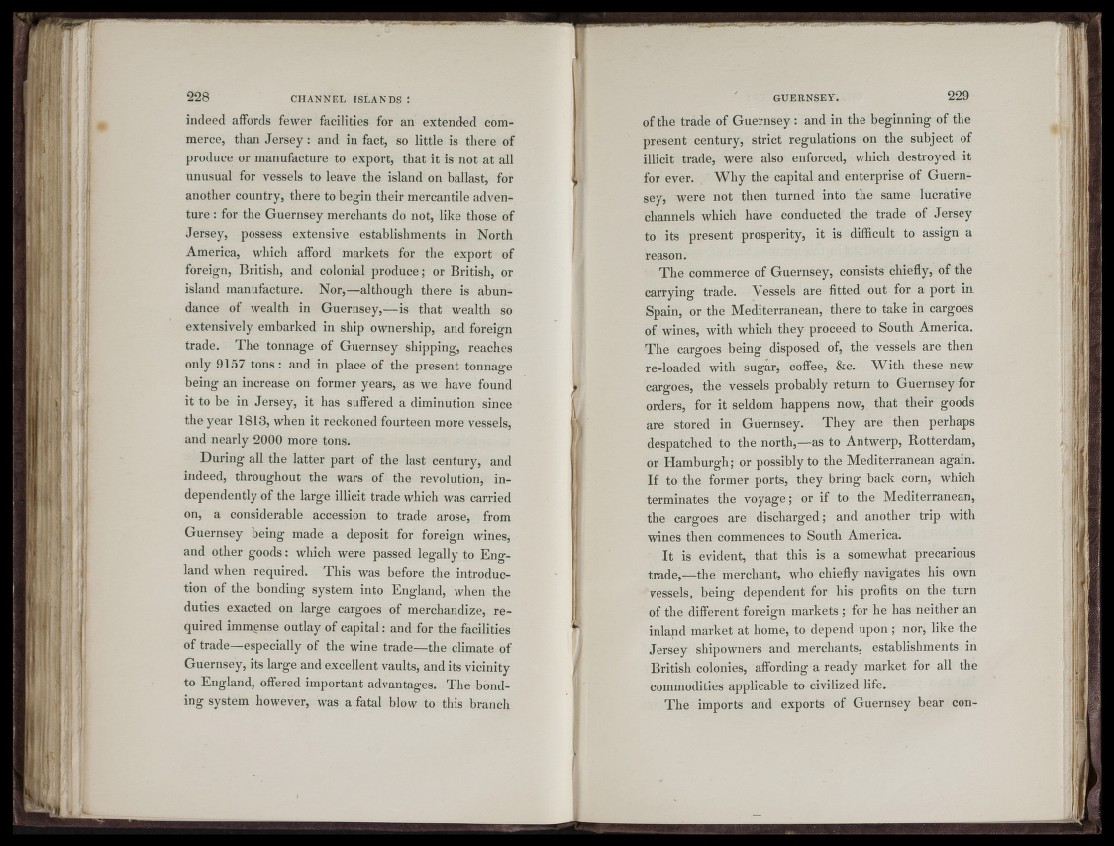
I
J :
it
* i
A-
U (
’ n
!
\ i
h i
indeed affords fewer facilities for an extended commerce,
than Je rsey : and in fact, so little is there of
produce or manufacture to export, that it is not at all
unusual for vessels to leave the island on ballast, for
another country, there to begin their mercantile adventure
: for the Guernsey merchants do not, like those of
Jersey, possess extensive establishments in North
America, which afford markets for the export of
foreign, British, and colonial produce; or British, or
island manufacture. Nor,—although there is abundance
of wealth in Guernsey,—is that wealth so
extensively embarked in ship ownership, and foreign
trade. The tonnage of Guernsey shipping, reaches
only 9157 tons: and in place of the present tonnage
being an increase on former years, as we have found
it to be in Jersey, it has suffered a diminution since
the year 1813, when it reckoned fourteen more vessels,
and nearly 2000 more tons.
During all the latter part of the last century, and
indeed, throughout the wars of the revolution, independently
of the large illicit trade which was carried
on, a considerable accession to trade arose, from
Guernsey being made a deposit for foreign vdnes,
and other goods: which were passed legally to England
when required. This was before the introduction
of the bonding system into England, when the
duties exacted on large cargoes of merchandize, required
immense outlay of capital: and for the facilities
of trade—especially of the wine trade—the climate of
Guernsey, its large and excellent vaults, and its vicinity
to England, offered important advantages. The bonding
system however, was a fatal blow to this branch
of the trade of Guernsey : and in the beginning of the
present century, strict regulations on the subject of
illicit trade, were also enforced, which destroyed it
for ever. Why the capital and enterprise of Guernsey,
were not then turned into the same lucrative
channels which have conducted the trade of Jersey
to its present prosperity, it is difficult to assign a
reason.
The commerce of Guernsey, consists chiefly, of the
carrying trade. Vessels are fitted out for a port in
Spain, or the Mediterranean, there to take in cargoes
of wines, with which they proceed to South America.
The cargoes being disposed of, the vessels are then
re-loaded with sugar, coffee, &c. With these new
cargoes, the vessels probably return to Guernsey for
orders, for it seldom happens now, that their goods
are stored in Guernsey. They are then perhaps
despatched to the north,—as to Antwerp, Rotterdam,
or Hamburgh; or possibly to the Mediterranean again.
If to the former ports, they bring back corn, which
terminates the voyage; or if to the Mediterranean,
the cargoes are discharged; and another trip with
wines then commences to South America.
It is evident, that this is a somewhat precarious
trade,—the merchant, who chiefiy navigates his own
vessels, being dependent for his profits on the turn
of the different foreign markets ; for he has neither an
inland market at home, to depend upon ; nor, like the
Jersey shipowners and merchants, establishments in
British colonies, affording a ready market for all the
commodities applicable to civilized life.
The imports and exports of Guernsey bear conii
i l l